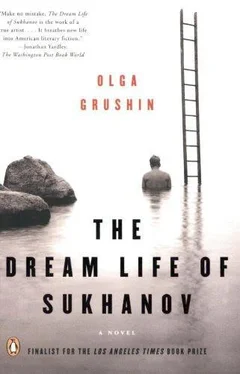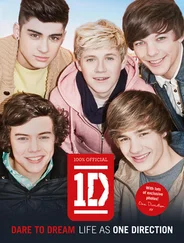Setting the emptied cup back into its porcelain nest, Sukhanov fed a blank page into his ancient typewriter. Strangely, in spite of the auspicious beginning, he felt singularly uninspired and for a while sat without typing, lightly tapping his index finger against the space bar and looking at his shelves. He knew the contents of his work library down to the spine. Starting with the subdued yet foreboding drumroll of a short essay collection by Marx and Engels, it continued with the tremulous flutelike notes of Plekhanov and Lunacharsky, then, with a wide, powerful sweep, moved into the avalanchine brasses of the maroon-clad marching band of Lenin’s Complete Works, and finally, passing through an unwavering chorus of the next sixty years of Soviet criticism (his own specimens proudly present in the multicolored glory of all their editions), disintegrated rather incongruously into a random assortment of art books, with the chaotic wheeze and rattle of surrealist castanets, gongs, and cymbals all but drowning out the Renaissance violins. (The surrealist gathering included a perplexing brochure, published in New York, entitled “Safe Surrealist Games for Your Home,” and a catalogue whose cover pictured a man in a bowler hat with a bird in place of his face.)
He sat gazing at the books for many empty minutes, ostensibly debating the choice of a quotation suitable as commentary on the Dali episode, in reality letting his thoughts wander somewhere far, far away; but eventually the shelves swam back into focus, and sighing, he reached for the most dog-eared volume of Lenin’s Works. It fell open predictably in just the place he sought, so often had he made use of these few thickly underlined paragraphs. Barely consulting the page, he began to type: “As Vladimir Ilyich Lenin said in his famous 1920 speech at the Third Congress of the Russian Communist Youth Union, ‘For us morality, taken apart from the human society, does not exist; it is a fraud. For us morality is subordinate to the interests of class struggle of the proletariat. Morality serves for the human society to ascend higher, to get rid of the exploitation of labor.’” He paused to consider, then went on, much more haltingly: “Without doubt, the same truth applies to art. Any art devoid of its underlying human principle can only lead to moral chaos, and…”
Each word dragged itself with an effort, like a half-dead prisoner burdened with lead weights at his ankles, and the world around seemed to conspire to make Sukhanov distracted and uncomfortable. The sun, rising higher, merrily danced off the bronze Pegasus at his elbow, tossing handfuls of annoying little flashes into his eyes. The customary piece of toast that Nina brought in at eleven o‘clock tasted vaguely of herring. The robe he wore felt stifling and unclean, but he was forced to perspire in helpless irritation since his clothes were trapped in the bedroom closet and he did not want to risk another awkward encounter with Dalevich. The telephone kept ringing with muffled persistence in the distant reaches of the apartment, making him lose what little concentration he could muster. After a mostly fruitless hour punctuated by sporadic bursts of typing, he pulled the page out of the typewriter and considered his single paragraph with a displeased frown. For a moment his pen hung poised over the lines like a bird of prey ready to swoop down for the kill; then, descending swiftly, it moved across the paper with such violence that a few sharp tears appeared in the text.
The new version was markedly shorter.
“In the well-known words of V. I. Lenin,” it read now, “ ‘Morality, taken apart from the human society, does not exist [tear]…. Morality serves for the human society to ascend higher [larger tear]….’ In certain ways, these words may apply to art.”
Here the paragraph ended, clearly leading nowhere. After some thought, Sukhanov crumpled the page and tossed it away, sending after it the three pages from the previous day. He missed the wastebasket every time. He then rolled a new sheet into the typewriter and banged out angrily: “Salvador Dali was born in 1904 in a small Spanish town. The artist’s father was…” At which point he stopped, and stared at nothing.
When, another futile hour later, an apologetic knock sounded on his door, he was glad for the interruption. It was his cousin, inviting him to dinner.
“I’ve taken the liberty to roast a small chicken,” said Fyodor Mikhailovich with a self-deprecating shrug, looking more than ever like a pleasant gentleman from the turn of the century.
At dinner, Vasily was absent again; he had apparently left sometime before, to spend the day at a friend’s dacha. “Ah yes, those last joys of summer,” said Sukhanov with a short laugh, addressing no one in particular. Nina had wanted to set the table in the dining room, since they had a guest, but Dalevich had implored her not to do anything special on his account. “Please don’t pay any heed to my presence,” he had begged in a heartfelt voice. In truth, it was rather hard to ignore his presence, as the man dominated all conversation. A curator of some northern folk museum, he had come to Moscow, it seemed, for the purpose of researching a book on icons, and now, his beard bristling, his glasses dancing, spoke with an endless, tiresome enthusiasm about egg yolk and cinnabar and what it must have meant for an artist to extract the colors for his masterpieces with his own hands from the world around him, from the earth upon which he had walked….
Sukhanov soon grew restless. “So, Fyodor,” he interrupted with a thin smile, “what do you think, did Rublev really exist, or is this just another myth of art history?”
Dalevich looked startled. Then he laughed.
“The only reason people doubt the existence of Rublev—or Shakespeare, for that matter,” he said, raising a gnawed chicken leg for emphasis, “is that it’s hard for ordinary minds like ours to imagine a genius of such magnitude. It makes us feel safer, wouldn’t you agree, to split a giant into several more manageable, only moderately oversized figures. And yet, however much it may dwarf us, I’m certain that the giants did live.” He paused for a discreet nibble on the chicken leg, then said mildly, “I hear, Tolya, you are writing a book as well?”
Sukhanov ceased smiling.
“An article,” he said stiffly. “About Dalí. The surrealist.”
“Ah, but how fascinating!” Fyodor Mikhailovich exclaimed with delight. “So what’s your opinion of him, if I may ask?”
Avoiding references to either capitalism or socialism, Sukhanov carefully discoursed on the harmful irrationality of surrealist works, which set out to pervert the sacred purpose of art—that of leading mankind to new triumphs, to the greater and fuller realization of its potential. Fyodor Mikhailovich nodded with polite interest.
“Naturally, your article must express the official viewpoint of your magazine,” he said when Sukhanov finished. “I was more curious to find out what you yourself thought about Dali. Do you like his paintings, Tolya? Do you think they are good art?”
Ksenya tried to suppress a snicker and failed—and once again, Sukhanov had the strange, disorienting feeling that his life had made yet another circle, that someone had asked him these very questions before.
He looked at his cousin with barely hidden hostility.
“Is it so inconceivable that my own viewpoint actually coincides with that of my magazine?” he said sharply. “What do you think about Dali? You like him, I take it?”
“No, I can’t say I do,” said Fyodor Mikhailovich thoughtfully. “True, the man once had undeniable talent. His early visions are haunting, don’t you find—those pulpy, dripping clocks, those burning giraffes, Venus de Milo with drawers carved all along her body—great, dark metaphors for our nightmarish century. Unfortunately, after these first brilliant steps, he stopped striving and began to repeat himself—more clocks, more giraffes, more drawers, all those sleek juxtapositions of random objects that seem striking for a moment but are devoid of any real meaning, all those amusing tricks for the eye, like Raphael’s Madonna fitted into an ear, you know it? He managed to trivialize himself completely. True art, in my modest opinion, must uphold a harmonious balance between form and content, and content is precisely what he’s lost. The man is nothing but a trickster now. A pity, really. He allowed the surrealist form he once invented to overtake him and thus failed to live up to the demands of his own gift, becoming just another small man cursed with a great talent…. Nina Petrovna, are you all right?”
Читать дальше








![Theresa Cheung - The Dream Dictionary from A to Z [Revised edition] - The Ultimate A–Z to Interpret the Secrets of Your Dreams](/books/692092/theresa-cheung-the-dream-dictionary-from-a-to-z-r-thumb.webp)



